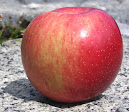In what has become a painful annual ritual, the Environmental Working Group last month again named apples as the produce most tainted with chemicals, the worst of of its "Dirty Dozen."
The group also made a splash this spring with a report that 80% of American apples are "coated" with a chemical banned in Europe, effectively shutting down the export market.
Farmers use pesticides, herbicides, fungicides, fertilizers, and preservatives to deliver unblemished fresh-tasting apples to market.
Consumers for the most part demand the quality that these chemicals deliver.
The Pesticide Action Network (a separate organization) details 42 chemicals found on apples by the U.S. Department of Agriculture.
If you don't want to follow me into the weeds with this, my 2011 report on this subject provides a shorter take.
The nonprofit EWG bases its findings primarily on tests performed by U.S. government agencies. It takes pains every year to note,
the health benefits of a diet rich in fruits and vegetables outweigh the risks of pesticide exposure.
The group suggests only that consumers can avoid the worst of these chemicals by buying organic—and that there is an above-average benefit to organic apples. (And here's a similar argument from Forbes.)
Organic can match conventional for quality. The price of organic produce is is generally higher because organic methods are more labor-intensive and/or entail a smaller market-quality yield.
Organic of course does not mean chemical-free, but the chemicals used in organic orchards (if any) are generally simpler and less toxic.
Organic American apples score much better than conventional apples in pesticide tests. (The link is one of the 42 click-throughs from the Pesticide Action Network page above. It appears to be based on this USDA report.)
Maybe we have to eat a peck of poison before we die, but we have some say over what poison and how much.



Can you imagine if an American urban mother bit into a supermarket apple and there was a codling moth maggot inside? First she'd have to lay on the couch with a moist towel on her forehead, they after recovery she'd call her attorney to sue the grocer and grower for emotional damages. We've done this to ourselves.
ReplyDeleteI suppose many people who live separate from the land may be guilty of unrealistic or even romantic attitudes about food.
DeleteMuch easier to think in absolutes, but most of us do not eat that way.